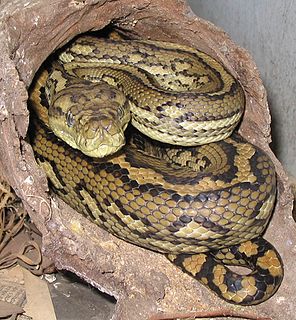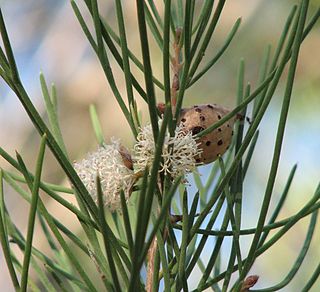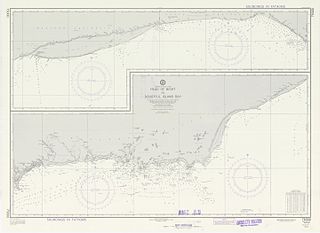Related Research Articles

Christinus is a genus of Gekkonidae geckos found in southern regions of Australia. It contains species and subspecies that are regionally termed as marbled geckos. The contrasted patterns of these geckos, marbling, are found in a variety of reddish-brown, grey, silver, white, black and purplish hues. They are frequently found in old knotted trees and sometimes congregate in large numbers in established urban environments.

Wallacea is a biogeographical designation for a group of mainly Indonesian islands separated by deep-water straits from the Asian and Australian continental shelves. Wallacea includes Sulawesi, the largest island in the group, as well as Lombok, Sumbawa, Flores, Sumba, Timor, Halmahera, Buru, Seram, and many smaller islands. The islands of Wallacea lie between the Sunda Shelf to the west, and the Sahul Shelf including Australia and New Guinea to the south and east. The total land area of Wallacea is 347,000 km2 (134,000 sq mi).

Underwoodisaurus milii is a species of gecko, a lizard in the family Carphodactylidae. The species is commonly known as the thick-tailed or barking gecko, referring to its distinctive plump tail and sharp, barking defensive call. The genus is also often called thick-tailed geckos as a group, along with the species Uvidicolus sphyrurus.

Morelia spilota, commonly referred to as the carpet python, is a large snake of the family Pythonidae found in Australia, New Guinea, Bismarck Archipelago, and the northern Solomon Islands. Many subspecies are described; ITIS lists six, the Reptile Database six, and the IUCN eight.

Tiger snakes are a large and highly venomous snake of southern Australia, including its coastal islands and Tasmania. These snakes are often observered and locally well known by their banding, black and yellow like a tiger, although the species can be highly variable in coloration and patterning. All populations are classified within the genus Notechis (Elapidae), their diverse characteristics have been classified either as distinct species or by subspecies and regional variation.

Chelodina, collectively known as snake-necked turtles, is a large and diverse genus of long-necked chelid turtles with a complicated nomenclatural history. Although in the past, Macrochelodina and Macrodiremys have been considered separate genera and prior to that all the same, they are now considered subgenera of the Chelodina, further Macrochelodina and Macrodiremys are now known to apply to the same species, hence Chelydera is used for the northern snake-necked turtles.

The black-flanked rock-wallaby, also known as the black-footed rock-wallaby or warru, is a species of wallaby, one of several rock-wallabies in the genus Petrogale. A shy, nocturnal herbivore, its two main subspecies are found in mostly isolated populations across western and southern Western Australia (WA), the Northern Territory and parts of South Australia (SA). With some subspecies showing a decline in populations in recent years, the whole species is classed as an endangered species under the Commonwealth EPBC Act.

The amethystine python, also known as the scrub python or sanca permata locally, is a species of non-venomous snake in the family Pythonidae. The species is found in Indonesia, Papua New Guinea, and Australia. Popular among reptile enthusiasts, and noted for its coloration and size, it is one of the six largest snakes in the world, as measured either by length or weight, and is the largest native snake in Australia and Papua New Guinea.

The pygmy python, also known as the anthill python, is a species of snake found in Western Australia. Their common names refer to the fact that they are the smallest member of the family Pythonidae and are often found in termite mounds. The specific epithet is derived from the state capital, Perth, despite the fact that this place is not within the range of the species. No subspecies are currently recognized.

Hakea drupacea, commonly known as sweet scented hakea, is a tree or shrub which is native to south west Western Australia.

Woody Island is an island off the south coast in the Goldfields-Esperance region of Western Australia.
The spotted-thighed tree frog is a Western Australian tree frog species in the family Pelodryadidae.

The Archipelago of the Recherche, known locally as the Bay of Isles, is a group of 105 islands, and over 1200 "obstacles to shipping", off the south coast of Western Australia. The islands stretch 230 km (140 mi) from east to west and to 50 km (31 mi) off-shore encompassing an area of approximately 4,000 square kilometres (1,544 sq mi). The western group is near Esperance and the eastern group at Israelite Bay. They are located in coastal waters, part of which is designated the Recherche Archipelago Nature Reserve.

Morelia imbricata is a large snake found in southern regions of Western Australia and western South Australia. A member of the python family, it is commonly known as the southwestern carpet python.
Ronald Eric Johnstone is an Australian ornithologist and herpetologist who worked for the Western Australian Museum for many years. The bat species Otomops johnstonei is named in his honour. The lizard species Carlia johnstonei is named in his honor.

Ctenophorus ornatus, the ornate crevice-dragon or ornate dragon, is a species of lizard in the family Agamidae. It is found on granite outcrops of Western Australia.
The Pilbara monitor, also known commonly as Bush's monitor, Bush's pygmy monitor, and the Pilbara mulga goanna, is a species of monitor lizard in the family Varanidae. The species is endemic to Australia.

Middle Island is an island off the south coast of Western Australia in the Recherche Archipelago, around 120 km (75 mi) south-east of Esperance. It is known for its pink lake, Lake Hillier. Goose Island lies just adjacent to the north.
Salisbury Island is located in the Recherche Archipelago off the south coast of Western Australia.
References
- ↑ Browne-Cooper, R.; Bush, B.; Maryan, B. & Robinson, D. (2007). "Island species lists; Recherché Archipelago". Reptiles and Frogs in the Bush: Southwestern Australia. University of Western Australia Press. p. 281. ISBN 978-1-920694-74-6.
- ↑ "Reptiles database: area search". FaunaBase. Western Australian Museum . Retrieved 1 April 2008.
Specimen records (Israelite Bay)
[ dead link ]